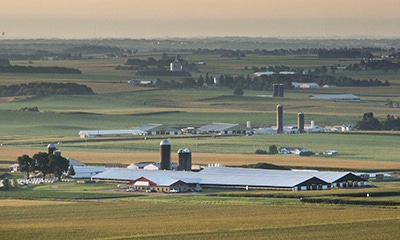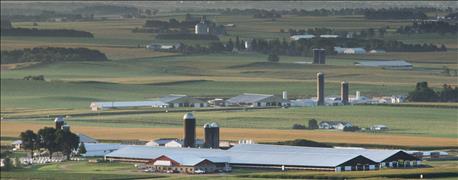April 21, 2016

Many farms, whether owned by a single or multiple owners, operate as a limited liability company or LLC. LLC owners may wonder why they formed an LLC, or those not operating your farm as an LLC may wonder whether or not you should operate your farm as an LLC. One or more of your farm advisors may have recommended forming an LLC and now you are wondering if an LLC is a good idea for you.

An LLC combines many of the best features of all types of business organization.
LLC basics
An LLC is a type of business legal entity that was created in Wisconsin (and other states) approximately 20 years ago. Because an LLC is a separate legal entity, it can buy, sell and hold property apart from its owners and is also responsible for its own debts and other liabilities. An ownership interest in an LLC is called an LLC interest. A person who holds an LLC interest is called an LLC member.
There are primarily two documents necessary to create an LLC in Wisconsin. First, to create an LLC in Wisconsin, a document called Articles of Organization must be filed with the State of Wisconsin Department of Financial Institutions. The Articles of Organization are short and simple which bring the LLC into legal existence and contain the following information:
The LLC’s name
*The name and address of the organizer (who may or may not be a member);
*The name and address of the registered agent (the name and address of the individual to accept service of legal papers, such as a lawsuit, on behalf of the LLC);
*A statement whether the LLC is member managed or manager managed (as described below).
The second legal document necessary to create an LLC in Wisconsin is an operating agreement. An operating agreement contains the internal business operating rules for the LLC. If an LLC’s operating agreement fails to address a particular issue, provisions in Wisconsin’s LLC law set the applicable default rules. Nearly all of the default rules written in the LLC statute may be changed in some manner by a written operating agreement.
The LLC state statute provides that there is a choice whether an LLC is member-managed vs. manager-managed. In a member-managed LLC, all of the members manage the LLC’s day-to-day business and affairs subject to the terms of the operating agreement. In a manager-managed LLC, the members appoint a person or persons, who may or may not also be a member, as manager(s) to manage the day-to-day operations of the LLC.
Finally, persons who hold LLC interests may hold different kinds and amounts of “management rights” and “economic rights” in the LLC. For example, an LLC member’s creditor may seize such member’s LLC interests. However, unless admitted as a member by the LLC’s remaining members, the creditor holding the LLC interest is only entitled to receive the profits that members of that class would otherwise be entitled to recover and has no management rights. In particular, the creditor cannot force the remaining members to make any profit distributions if the remaining members choose instead to reinvest profits.
LLC benefits
As explained above, an LLC is fairly simple to form. The Articles of Organization require a one-time filing fee of $130 and an annual fee of $25. In addition, the LLC’s Operating Agreement, or “rules” on how the LLC is operated, can be as straightforward or complex as desired, depending upon the circumstances.
Corporations typically must conduct formal meetings and maintain corporate books and records to retain the liability protection granted to corporations. An LLC operating agreement can be drafted to avoid the necessity of the kind of formal meeting and records required of corporations.
One of the reasons LLCs are extremely popular right now is due to an LLC’s flexibility. As the circumstances of the farm change, an LLC’s structure can change. For example, involved farm children can be LLC managers and non-farm children and/or parents who are less involved in the farm can be listed as members only. Corporations and partnerships have no similar type of provisions. In addition, unlike corporations, there are generally no tax consequences to the differentiation.
Finally, an LLC can be very functional as well. As you likely know, a properly organized LLC provides protection against liability lawsuits. However, limited liability companies can be also used to efficiently transfer farm assets over a period of time. For example, the farm personal property can be put into one LLC and the farm real estate can be put into another LLC. The interests in each LLC can be transferred at different paces by the senior generation. Any LLC interests not transferred during lifetime could also be held by a revocable living trust. As such, all of these farm assets can transfer efficiently, during life or upon death, without multiple deeds, bills of sale, transfer fees or probate fees.
An LLC is a still a somewhat new type of business organization. An LLC combines many of the best features of all types of business organization. It was designed to promote business by offering business owners protection from personal liability for business obligations combined with a structure that is simple and easy to operate. All business owners, including farmers, should strongly consider the use of an LLC.
Schneider is a partner in the ag law firm of Twohig Rietbrock Schneider & Halbach S.C. Call Schneider at 920-849-4999.
You May Also Like




